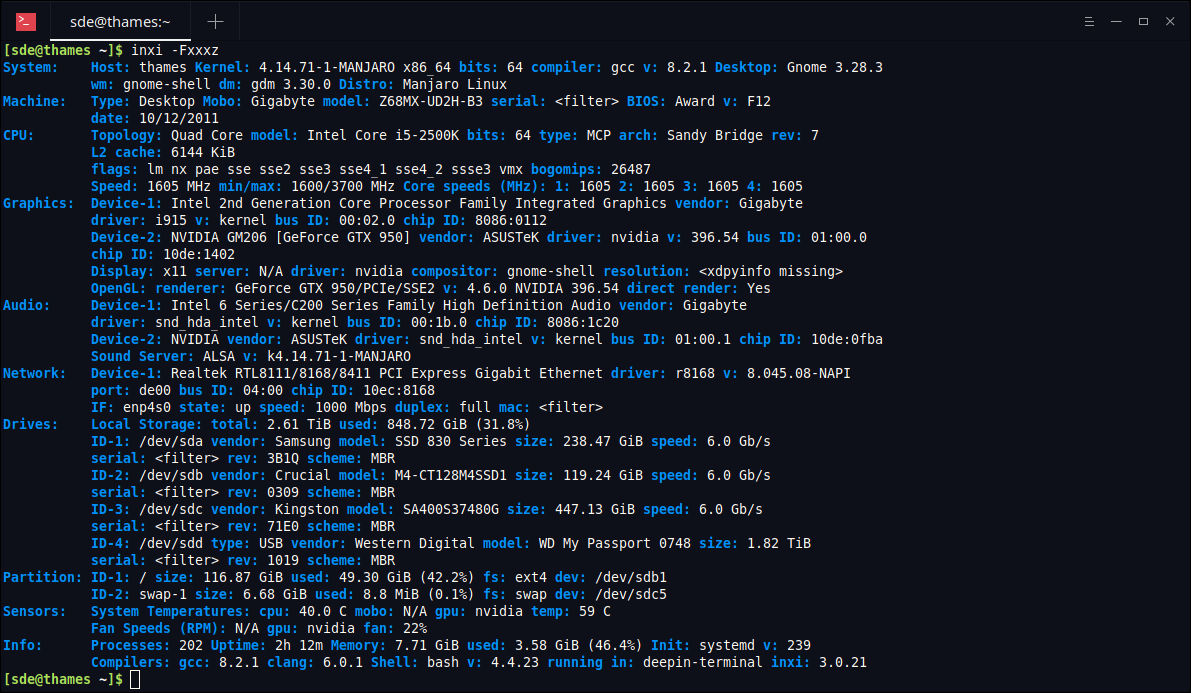This is the fifth in our series of articles highlighting essential system tools. These are small utilities, useful for system administrators as well as regular users of Linux based systems. The series examines both graphical and text based open source utilities. For details of all tools in this series, please check the table in the summary section.
The first tools under the spotlight were ps_mem, a small utility that accurately reports memory consumption of software, and gtop, a system monitoring dashboard. The third tool we showcased was pet, a simple command-line snippet manager. We then covered Alacritty, an innovative graphical utility.
This time, we’ll take a look at inxi, a Perl script that interrogates your system.
Installation
inxi is available in most Linux distribution repositories, and also runs on BSD. The software is included in the community repository in Manjaro.
If the software is not included in your distribution’s repositories, you can download the script from the project’s GitHub repository.
In operation
inxi is a command line system information script built for the console as well as Internet Relay Chat (IRC). The software also crops up in forum technical support for debugging purposes. It helps people to determine users’ system configurations and hardware without having to ask a lot of questions.
inxi shows a lot of useful information. This information includes system hardware, CPU, drivers, Xorg, desktop, kernel, gcc version(s), processes, memory data, audio, partitions, sensor output, and a wide variety of other information. It even shows present CPU hardware vulnerabilities and applied mitigations.
In order to maintain basic privacy and security, inxi used on IRC automatically filters out a user’s network device MAC address, WAN and LAN IP, their \fB/home\fR username directory in partitions, and a few other items. These can be enabled in private chats if necessary.
Extra data options can be conveniently triggered by one or more -x flags. For example, in the image below, inxi is reporting with extra, extra, extra data.
inxi seeks to support a wide range of operating systems and hardware, from basic consumer desktops, to professional hardware and servers.
Summary
If you need help from the Linux community, inxi is an essential utility that lets others help you debug issues. By providing concise information about a system, while filtering out sensitive data, it’s a time-saver for all participants.
Website: smxi.org
Support: Code Repository
Developer: Harald Hope, Scott Rogers, Horst Tritremmel, Steven Barrett, Jarett Stevens
License: GNU GPL v3 or greater
inxi is written in Perl. Learn Perl with our recommended free books and free tutorials.
All the essential tools in this series:
| Essential System Tools | |
|---|---|
| Alacritty | Innovative, hardware-accelerated terminal emulator |
| BleachBit | System cleaning software. Quick and easy way to service your computer |
| bottom | Graphical process/system monitor for the terminal |
| btop++ | Monitor usage and stats for CPU, memory, disks, network and processes |
| catfish | Versatile file searching software |
| Clonezilla | Partition and disk cloning software |
| CPU-X | System profiler with both a GUI and text-based |
| Czkawka | Find duplicate files, big files, empty files, similar images, and much more |
| ddrescue | Data recovery tool, retrieving data from failing drives as safely as possible |
| dust | More intuitive version of du written in Rust |
| f3 | Detect and fix counterfeit flash storage |
| Fail2ban | Ban hosts that cause multiple authentication errors |
| fdupes | Find or delete duplicate files |
| Firejail | Restrict the running environment of untrusted applications |
| Glances | Cross-platform system monitoring tool written in Python |
| GParted | Resize, copy, and move partitions without data |
| GreenWithEnvy | NVIDIA graphics card utility |
| gtop | System monitoring dashboard |
| gWakeOnLAN | Turn machines on through Wake On LAN |
| hyperfine | Command-line benchmarking tool |
| HyFetch | System information tool written in Python |
| inxi | Command-line system information tool that's a time-saver for everyone |
| journalctl | Query and display messages from the journal |
| kmon | Manage Linux kernel modules with this text-based tool |
| Krusader | Advanced, twin-panel (commander-style) file manager |
| Nmap | Network security tool that builds a "map" of the network |
| nmon | Systems administrator, tuner, and benchmark tool |
| nnn | Portable terminal file manager that's amazingly frugal |
| pet | Simple command-line snippet manager |
| Pingnoo | Graphical representation for traceroute and ping output |
| ps_mem | Accurate reporting of software's memory consumption |
| SMC | Multi-featured system monitor written in Python |
| Timeshift | Reliable system restore tool |
| QDirStat | Qt-based directory statistics |
| QJournalctl | Graphical User Interface for systemd’s journalctl |
| TLP | Must-have tool for anyone running Linux on a notebook |
| Unison | Console and graphical file synchronization software |
| VeraCrypt | Strong disk encryption software |
| Ventoy | Create bootable USB drive for ISO, WIM, IMG, VHD(x), EFI files |
| WTF | Personal information dashboard for your terminal |


New inxi repository:
Link updated, thanks.